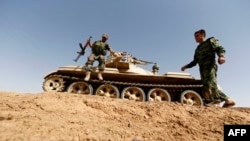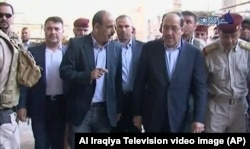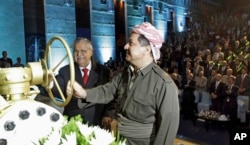IRBIL, IRAQ —
Kurdish leaders fear Iraq is destined for a long sectarian civil war if Iraqi Prime Minister Nouri al-Maliki refuses to step aside and insists on confronting militarily the Sunni Muslim uprising roiling the country.
Much of the media focus on the current strife in Iraq is on the role played by the al-Qaida breakaway, the Islamic State of Iraq and Levant (ISIL).
But Kurdish leaders said jihadists would not have grown so strong had they not been able to feed off widespread Sunni resentment toward al-Maliki and anger at his government's exclusionary policies favoring Shi'ite Muslims, the majority group in Iraq.
As they see it, the only solution to the crisis is for Iraq to adopt a federal system.
"If al-Maliki had implemented the Iraqi constitution and allowed a federal system to develop, we wouldn’t be in this mess," said Ahmed Askari, a veteran Kurdish Peshmerga commander and head of the security council of the city of Kirkuk.
"Instead, he banked everything on the army and thought if he had a strong army, he could control everyone, including Kurdistan. But the army has now collapsed," Askari said.
Reconciliation process
Kurdish political leaders want al-Maliki’s Shi'ite-dominated government to be replaced by one able to reach out to Sunni Muslims and start a process of reconciliation to undercut the jihadist exploitation of Sunni resentment.
U.S. officials also have urged al-Maliki to pursue reconciliation, and there has been little disguise of their hope that the prime minister steps down.
Al-Maliki, though, has shown no indication he will surrender power. Nor are there signs that Iran, where al-Maliki lived for seven years in exile during the dictatorship of Saddam Hussein, is ready to withdraw its backing of him.
Iraqi Kurds see the current crisis as presenting opportunities as well as great danger for them, but most are eager to stay out of the fighting.
"We are trying to keep away from this war," Mariwan Naqshbandi, a spokesman for the Ministry of Religious Affairs, told CBN News. "The national issue is much more important for us. We don’t want to be involved in this because the war is between Sunni and Shi'ite."
Kurdish Peshmerga forces are focused on self-defense and protecting semi-autonomous Kurdistan and securing territory close to their lines, although they have seized full control of the city of Kirkuk, which has a large Kurdish population, and some areas of the Nineveh plains just outside Mosul and an hour’s drive from the Kurdistan capital of Irbil.
Peshmerga commanders said they moved to secure the oil-rich province of Kirkuk to ensure jihadists didn’t overrun it, but privately they say they don’t want to relinquish the city as they did as part of a deal with Baghdad after the fall of Saddam Hussein.
The biggest question is whether Kurdish leaders will seize this moment and declare an independent state – something many ordinary Kurds, buoyed by the territorial gains and despair at the Sunni-Shi'ite violence, said they want.
"We should grab our future," said Mazan, a 19-year-old student who said most of his friends argue it would be better to be separate from the rest of Iraq.
“It would be the best thing,” he added.
But political leaders are more hesitant about statehood and are careful to insist they don’t want to see a formal break-up of Iraq.
Federalism 'best solution'
Kurdish Prime Minister Nechirvan Barzani told NBC News Sunday that while Iraq is an artificial country with many disparate groups living within its borders, “the best solution for Iraq” would be federalism.
But Barzani has also made clear in other interviews that it likely will be impossible for Iraq to revert to how it was before Mosul fell and that he isn’t sure Iraq can stay together.
The biggest fear for Kurdish leaders is that statehood will leave them exposed: Iraqi Kurdistan has changed dramatically since the U.S.-led invasion of Iraq, transforming itself from an economic backwater into a prosperous oil-based statelet.
Irbil boasts modern new buildings and a skyline of cranes, all helping to fuel Kurdish self-confidence.
But Iraqi Kurdistan has been able to grow for many years protected by an international security umbrella, and without an American military presence in the area, it remains vulnerable.
Although political relations have warmed with neighboring Turkey – the Turks have supplied Iraqi Kurdistan with major loans to help them pay government salaries – and energy deals between Irbil and Ankara have developed apace, it remains unclear whether the Kurds could rely on Turkey for security assistance if needed, analysts said.
And, if the jihadists grow stronger in the south, the Kurds may need friends in Baghdad.
Much of the media focus on the current strife in Iraq is on the role played by the al-Qaida breakaway, the Islamic State of Iraq and Levant (ISIL).
But Kurdish leaders said jihadists would not have grown so strong had they not been able to feed off widespread Sunni resentment toward al-Maliki and anger at his government's exclusionary policies favoring Shi'ite Muslims, the majority group in Iraq.
As they see it, the only solution to the crisis is for Iraq to adopt a federal system.
"If al-Maliki had implemented the Iraqi constitution and allowed a federal system to develop, we wouldn’t be in this mess," said Ahmed Askari, a veteran Kurdish Peshmerga commander and head of the security council of the city of Kirkuk.
"Instead, he banked everything on the army and thought if he had a strong army, he could control everyone, including Kurdistan. But the army has now collapsed," Askari said.
Reconciliation process
Kurdish political leaders want al-Maliki’s Shi'ite-dominated government to be replaced by one able to reach out to Sunni Muslims and start a process of reconciliation to undercut the jihadist exploitation of Sunni resentment.
U.S. officials also have urged al-Maliki to pursue reconciliation, and there has been little disguise of their hope that the prime minister steps down.
Al-Maliki, though, has shown no indication he will surrender power. Nor are there signs that Iran, where al-Maliki lived for seven years in exile during the dictatorship of Saddam Hussein, is ready to withdraw its backing of him.
Iraqi Kurds see the current crisis as presenting opportunities as well as great danger for them, but most are eager to stay out of the fighting.
"We are trying to keep away from this war," Mariwan Naqshbandi, a spokesman for the Ministry of Religious Affairs, told CBN News. "The national issue is much more important for us. We don’t want to be involved in this because the war is between Sunni and Shi'ite."
Kurdish Peshmerga forces are focused on self-defense and protecting semi-autonomous Kurdistan and securing territory close to their lines, although they have seized full control of the city of Kirkuk, which has a large Kurdish population, and some areas of the Nineveh plains just outside Mosul and an hour’s drive from the Kurdistan capital of Irbil.
Peshmerga commanders said they moved to secure the oil-rich province of Kirkuk to ensure jihadists didn’t overrun it, but privately they say they don’t want to relinquish the city as they did as part of a deal with Baghdad after the fall of Saddam Hussein.
The biggest question is whether Kurdish leaders will seize this moment and declare an independent state – something many ordinary Kurds, buoyed by the territorial gains and despair at the Sunni-Shi'ite violence, said they want.
"We should grab our future," said Mazan, a 19-year-old student who said most of his friends argue it would be better to be separate from the rest of Iraq.
“It would be the best thing,” he added.
But political leaders are more hesitant about statehood and are careful to insist they don’t want to see a formal break-up of Iraq.
Federalism 'best solution'
Kurdish Prime Minister Nechirvan Barzani told NBC News Sunday that while Iraq is an artificial country with many disparate groups living within its borders, “the best solution for Iraq” would be federalism.
But Barzani has also made clear in other interviews that it likely will be impossible for Iraq to revert to how it was before Mosul fell and that he isn’t sure Iraq can stay together.
The biggest fear for Kurdish leaders is that statehood will leave them exposed: Iraqi Kurdistan has changed dramatically since the U.S.-led invasion of Iraq, transforming itself from an economic backwater into a prosperous oil-based statelet.
Irbil boasts modern new buildings and a skyline of cranes, all helping to fuel Kurdish self-confidence.
But Iraqi Kurdistan has been able to grow for many years protected by an international security umbrella, and without an American military presence in the area, it remains vulnerable.
Although political relations have warmed with neighboring Turkey – the Turks have supplied Iraqi Kurdistan with major loans to help them pay government salaries – and energy deals between Irbil and Ankara have developed apace, it remains unclear whether the Kurds could rely on Turkey for security assistance if needed, analysts said.
And, if the jihadists grow stronger in the south, the Kurds may need friends in Baghdad.






